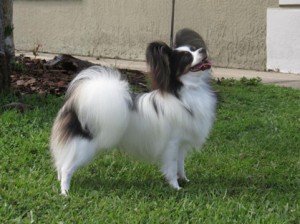New DNA Testing Scheme to Combat Inherited Disease in The Papillon
 In a move designed to combat inherited disease in the Papillon, the Kennel Club has approved a new official DNA testing scheme for von Willebrand’s disease type 1 (vWD1) in the breed, following consultation with the Breed Health Coordinator.
In a move designed to combat inherited disease in the Papillon, the Kennel Club has approved a new official DNA testing scheme for von Willebrand’s disease type 1 (vWD1) in the breed, following consultation with the Breed Health Coordinator.
Von Willebrand’s disease is characterised by a reduced level of an important protein involved in blood clotting. The severity of clinical signs is variable, but commonly includes bleeding from the nose or gums, bruising and prolonged clotting time, with implications for surgical procedures.
Variants at several genes have been shown to be associated with von Willebrand’s disease, with vWD1 being the most common. This variant has been observed in Papillons, as has the disease, although a direct association between this variant and the occurrence and severity of the disease in Papillons is undocumented.
Von Willebrand’s disease type 1 is described as an autosomal-recessive condition. This means that a dog must inherit two copies of an abnormal gene (one from its mother and one from its father) before its health is likely to be affected. A dog that inherits only one copy of the abnormal gene (from its mother or its father) will likely have no signs of the disease, but will be a carrier and may pass the gene on to any offspring.
Tested dogs will be recorded on the Kennel Club systems as one of the following:
Clear
The dog does not have any copies of the abnormal gene associated with vWD1. The dog is highly unlikely to be clinically affected and will pass on only a normal copy of the gene to a puppy.
Carrier
The dog has one copy of the normal gene and one copy of the abnormal gene associated with vWD1. The dog is unlikely to be clinically affected but may pass on one copy of the normal gene, or one copy of the abnormal gene, to a puppy.
Affected
The dog has two copies of the abnormal gene associated with vWD1. The dog will likely be clinically affected by the disorder and will pass on one copy of the abnormal gene to any potential offspring.
To find out which laboratories the Kennel Club is able to record results from, and which labs will send results direct to the Kennel Club, please refer to the worldwide DNA testing list at www.thekennelclub.org.uk/worldwide-dna-tests. Please note that this listing is not necessarily comprehensive and other labs may offer the tests.
The Kennel Club constantly reviews DNA testing schemes in conjunction with breed clubs to ensure that breeders are supported with resources which help them to make responsible breeding decisions.
The Kennel Club works alongside breed clubs and breed health coordinators in a collaborative effort to improve the health of pedigree dogs and is happy to accommodate a club’s request to add a new DNA test to its lists. A formal request from the breed’s health coordinator or a majority request from the breed clubs is normally required to do this.
Test results will be added to the dog’s registration details which will trigger the publication of the result in the next available Breed Records Supplement. The result will appear on any new registration certificate issued for the dog and on the registration certificates of any future progeny of the dog, and also on the Health Test Results Finder on the Kennel Club website.
Results for dogs already tested can also be recorded, but owners will need to submit copies of the DNA certificates themselves. If the owner includes the original registration certificate for the dog (not a copy) then a new registration certificate will be issued, with the DNA result on it, free of charge. DNA test certificates should be emailed to health.results@thekennelclub.org.uk.
Owners are reminded that it is mandatory that the dog’s microchip (or tattoo) number is recorded along with either the dog’s registered name or registered number on any DNA certificates. Any test results that do not carry these identifying features will not be added to the Kennel Club database.
Short URL: http://caninechronicle.com/?p=183398
Comments are closed












